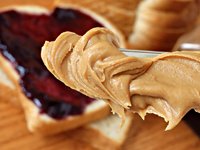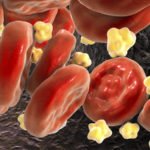It’s been a busy week in the world of drug and food industries regarding recent recalls. First, a deadly fungus showed up in a steroid concoction that physicians inject into the spine of patients suffering from back pain, spreading meningitis to at least 185 people.1 Then the Kellogg company got busted for little bits of metal mesh found in Mini-Wheats. Now, Starbucks turns out to be selling salmonella-infected Protein Bistro Boxes for breakfast. The salmonella resides in a little squeezy tube of peanut butter that comes packed in the box, and it’s not the good kind of salmonella being developed to cure some cancers.
Unfortunately, you aren’t in the clear even if you didn’t go to Starbucks, you didn’t eat Mini-Wheats, and you didn’t have a steroid injection in your spine this week. You still might be at risk for salmonella, since the FDA lists a whopping 240 products that might be infected, all coming from a batch of infected nuts and seeds distributed by the Sunland Company in Portales, New Mexico. If you shop at Costco, Target, Whole Foods, or Trader Joes–as most of us do–you just might have picked up one of the contaminated items. The lists includes spreads, crackers, and snacks–everything from Costco peanut butter to various brands of tahini to Whole Foods’ peanut sesame noodles, to nut butters from Target, almond butters from Trader Joe’s, and a wide variety of ice-creams including Alden’s organic.2
But salmonella merely makes people sick; it rarely kills them. The fungus-tainted steroid compound, on the other hand, has far more horrifying effects. Fourteen already have died from meningitis contracted after receiving one of the contaminated injections. The scary thing is that a whole lot more people may yet get sick, or even die. To date, 14,000 people have received injections from the infected batch and though most of those haven’t shown symptoms of the disease yet, they still might. It typically takes weeks or even months for symptoms to appear.3 It’s more than likely that the number of cases of the disease–and the number of fatalities–will rise.
The bad batch of the steroid, called methylprednisolone acetate, came from a compounding company in Framingham, Massachusetts. The fungus-tainted compound went out to 76 health clinics in 23 states. All the clinics that administered the tainted medication have been notified and asked to inform affected patients that they received a contaminated injection. They’ve also been told to watch for symptoms such as intense headache, fever, nausea and stroke-like symptoms. Meningitis affects the lining of the brain and the spine, and the symptoms are markedly unpleasant. The good news is that antifungal medications can often cure the disease. The bad news is that the medications are quite strong and difficult for some people to tolerate.
The compounding company has shut down operations and gone into hiding, even taking down its website, perhaps in reaction to a lawsuit filed by one of the first patients to contract meningitis from the injection. The plaintiff claims that the company “was negligent because it failed to use reasonable care when it designed, tested, manufactured, marketed, and sold doses of methylprednisolone acetate.” Undoubtedly, more lawsuits will follow.
Meanwhile, 35 people in 19 states have been hospitalized with salmonella tied to the infected Sunland products. Two-thirds of the victims have been kids under 10. Young children as well as the elderly and people with compromised immune systems are most at risk for complications. The rest of the population simply suffers unpleasant symptoms such as vomiting, diarrhea, fever, and cramping, but most healthy individuals will recover without treatment. That means that hundreds or thousands might have been sickened, but they wouldn’t necessarily have reported it since they got better on their own.
All 240 Sunland products have been subject to recent recalls. Again, take note that the product list extends far beyond peanut butter to all sorts of other items. If you think you might have consumed an infected product, you can call the Sunland recall hotline at 1-866-837-1018.4 Also, if you have any product at home containing peanuts, sesame, or almonds, check it out before stuffing it in your face–the inventory is extensive. For lists of affected products, check out the FDA information sheet.
As for the metal crunch breakfast cereal from Kelloggs, 2.8 million boxes of the cereal have been recalled at considerable expense–an estimated $30 million.5 (Last year, the company spent $100 million in recalls of foul-smelling boxes of Fruit Loops, Corn Pops, Apple Jacks, and Honey Smacks.) In this case, we’re talking about miniscule, trace amounts of metal mesh. Check out this You Tube video to see how much debris a magnet picks up when sweeping over a bowl of the cereal.
The company issued a statement saying, “We have initiated a voluntary recall due to the possible presence of fragments of flexible metal mesh from a faulty manufacturing part.” They didn’t indicate just how that manufacturing part got stuffed into the happy looking boxes. No injuries have been reported, but you can bet some kids got to stay home from school after contracting mysterious Mini-Wheats bellyaches.
As a side note, it’s probably worth mentioning that not one of these products came from China. Everyone likes to single out products from China as especially prone to contamination — often, consciously trying to avoid them. But in every case we’re talking about here, we’re talking 100% pure, homegrown, made in the USA, contamination. Just saying!
All in all, the prevalence of contamination in the drug and food industries might make one hesitate to consume anything that wasn’t grown at home. It’s also a good reminder that if you find yourself struck with sudden illness, it just might be related to something you ate or had prescribed. As always, the best advice is to keep your immune system in good working order by staying fit and taking appropriate immune-building supplements. It’s also worth keeping a supply of natural pathogen destroyers on hand — just in case.
1 Moisse, Katie. “Meningitis Outbreak: Minnesota Woman Sues Pharmacy.” ABC News. 12 October 2012. <http://abcnews.go.com/Health/Wellness/meningitis-outbreak-minnesota-woman-sues-pharmacy/story?id=17463558#.UHjCWq68GSp>
2 http://www.fda.gov/Safety/Recalls/MajorProductRecalls/SunlandNutSeedProductRecalls/default.htm
3 Alcindor, Yamiche and Roche, Walter. “As Meningitis Cases Rise, First Lawsuit Filed.” USA Today. 12 October 20012. <http://www.usatoday.com/story/news/nation/2012/10/12/meningitis-outbreak-lawsuit-minnesota/1630281/>
4 “Salmonella: Sunland, Inc., Expands Recall to All Peanut Butter Products.” 9 October 2012. KTUU.com. 12 October 2012. < http://articles.ktuu.com/2012-10-09/cashew-butter_34347814>
5 Velasco, Schuyler. “Kellogg Company Recalls Mini-Wheats. Metal Fragments in Cereal.” 11 October 2012. The Christian Science Monitor. 13 October 2012. < http://www.csmonitor.com/Business/2012/1011/Kellogg-Company-recalls-Mini-Wheats.-Metal-fragments-in-cereal>











